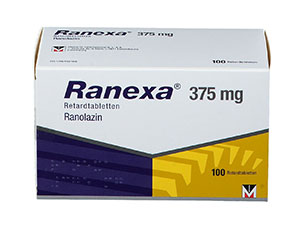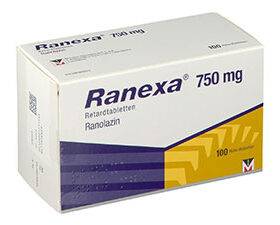- Your cart is empty
- Continue Shopping

Shop
Buy Ranexa Online

You can easily Buy Ranexa Online Overnight and get it delivered to your home quickly with same-day delivery with the help of Anxietymedsusa.com.
Introduction to Ranexa
Ranexa (ranolazine) is a prescription medication used to treat chronic angina, a type of chest pain caused by coronary artery disease. It belongs to a class of drugs called anti-aging agents.
Ranexa was developed by Gilead Sciences and approved by the U.S. Food and Drug Administration (FDA) in 2006. It is intended for people with chronic angina who are also taking other antianginal drugs like beta blockers or calcium channel blockers but are still having angina symptoms.
Ranexa helps relax constricted blood vessels and improves blood flow to the heart. This decreases the heart’s workload and reduces chest pain symptoms. However, Ranexa does not help treat heart rhythm problems and it should not be used to treat a heart attack.
Ranexa comes as extended-release tablets taken by mouth, usually twice daily. It is available as a brand-name drug and in generic form. Ranexa works differently than other angina medications and is the first antianginal drug in its class approved by the FDA in over 30 years.
How Ranexa Works?
Ranexa (ranolazine) is a medication that belongs to a class of drugs called antianginal agents. It works by improving blood flow to the heart and relieving angina symptoms.
Ranexa’s mechanism of action involves inhibiting the late sodium current in cardiac cells. By blocking this current, Ranexa reduces calcium overload which can lead to ischemia and dysfunction. This allows the heart to get more oxygen by improving blood flow and decreasing the heart’s workload.
Specifically, Ranexa binds to the inactive state of the sodium channel in cardiac muscle cells. This prevents sodium channels from opening too long, which reduces inward depolarizing currents. Ranexa does not have a direct effect on heart rate or blood pressure. By regulating sodium currents, Ranexa helps restore the heart’s electrical stability. This leads to fewer angina attacks.
Ranexa Uses
Ranexa is primarily used for treating chronic angina. Angina is a sensation of pain or discomfort in the chest caused by a lack of oxygenated blood reaching the heart muscle. Ranexa helps improve blood flow to the heart and decrease the frequency of angina attacks.
While Ranexa is only FDA-approved for chronic angina treatment, it has also been used off-label for other heart-related conditions. Some off-label uses include:
- Treatment of atrial fibrillation – Ranexa has been shown in some studies to help restore normal heart rhythm in people with atrial fibrillation. More research is still needed.
- Reducing ischemia during cardiac surgery – There is some evidence that Ranexa can reduce ischemia during coronary artery bypass grafting surgery and other cardiac surgical procedures. It may help protect the heart during surgery.
- Heart failure – Small studies indicate Ranexa may improve exercise tolerance and reduce hospitalizations in people with heart failure.
Ranexa Dosage
Ranexa is available in extended-release oral tablet forms. It comes in three different strengths:
- 500 mg
- 1000 mg
- 1500 mg
The recommended starting dosage for Ranexa is 500 mg taken twice daily. Your doctor may increase your dose based on how you respond to the medication. The maximum recommended dose is 1000 mg twice daily.
It is important to swallow Ranexa tablets whole and avoid crushing, breaking, or chewing them. Take Ranexa with or without food, but be sure to take it the same way each time. It is recommended to space out your doses approximately every 12 hours.
Ranexa Side Effects
Ranexa is typically well tolerated but may cause some side effects. Here is an overview of the common, serious, and other potential side effects associated with Ranexa.
Common Side Effects
Some of the more common side effects of Ranexa include:
- Dizziness
- Headache
- Constipation
- Nausea
Serious Side Effects
While rare, Ranexa may cause some more serious side effects that require prompt medical care. These include:
- Prolonged QT interval – seen on an ECG, may increase risk of abnormal heart rhythms
- Liver damage – symptoms can include nausea, fatigue, loss of appetite, itching, yellowing of skin or eyes
- Kidney failure – signs include swelling, shortness of breath, fatigue, confusion
Ranexa Interactions
Ranexa can interact with several other medications. It’s important to discuss all medications you are taking with your doctor before starting Ranexa to avoid potentially dangerous interactions.
Drugs to Avoid
The following drugs should not be taken with Ranexa:
Diltiazem – Ranexa taken with diltiazem can cause heart rhythm problems. Do not take Ranexa within 6 hours of diltiazem.
Ketoconazole – Ketoconazole is an antifungal medication that increases Ranexa levels in the body. Taking ketoconazole with Ranexa is not recommended.
Itraconazole – Like ketoconazole, itraconazole can raise Ranexa levels. Do not take itraconazole while using Ranexa.
Clarithromycin – This antibiotic can increase Ranexa concentrations and should be avoided.
Telithromycin – Increased risk of QT prolongation. Use caution.
Ranexa Warnings
Ranexa has several important warnings to be aware of before starting treatment.
Contraindications
Patients with the following conditions should not use Ranexa:
- Severe renal impairment (creatinine clearance <30 mL/min)
- Moderate hepatic impairment (Child-Pugh B)
- Concomitant use of strong CYP3A inhibitors
Black Box Warnings
Ranexa has a black box warning for QT interval prolongation.
Ranexa can prolong the QT interval, which may lead to an increased risk of torsades de pointes, a rare but serious heart rhythm condition. Patients at particular risk include those with long QT syndrome or taking other QT-prolonging drugs.
To minimize risk, the lowest effective Ranexa dose should be used. Electrocardiograms should be monitored for QT prolongation. Ranexa should be avoided in patients with congenital long QT syndrome. Potent CYP3A inhibitors must not be used with Ranexa.



